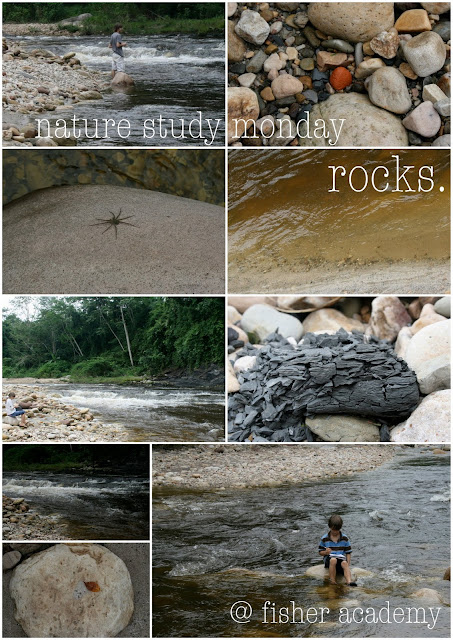
As for authority, people nowadays don't really like the terms
authority and
discipline.
Equality and
freedom are generally more to their liking. How 'bout you? I admit, I felt a subtle twinge of revolt upon utterance of the former two terms and an immediate corresponding sense of relief at mention of the latter. As progeny of Eden, it comes naturally I guess. I wonder though, if we can't come to terms with both and perhaps even work out some synergy between the two apparently opposite values?
Here's the beginning of wisdom...
(I am assuming that everyone entrusted with the bringing up of children recognizes the supreme Authority to Whom we are subject; without this recognition I do not see how it is possible to establish the nice relation which should exist between teacher and taught.) [*]
~ She is Charlotte Mason, who in this parenthesis, pretty much says
all that needs be said.
Need I say more? Seriously.
Alas, it is my intention to post
my thoughts, so I guess I will try to say
something else.
Even if it's all going to sound somewhat similar; about the parts I understand, that is. heheh. ;)
Oh. there is that one little thing I don't agree about...
The bit about the American physiologist who says it might be possible to live for 1,000 years.
[ahem. right. moving on...]
:: Spoiler Alert ::
If you don't like to know how the story ends, skip the paragraph immediately following.
Important words from the chapter:
docility = teachableness; acceptance of authority
hortatory = tending or aiming to exhort, ie, lecturing (which I don't use in this post for reasons that should be obvious)
deputed = appointed to perform a task for which another is responsible
arbitrary = random or based on whim
Important correlations:
teacher :: authority (… & docility)
taught :: docility (… & authority)
Important points:
Those in authority must govern as those also under authority... this fact should be discernible. [*]
A child does in fact have authority... over himself; to make himself attend, to make himself to know.
Oh and if you find that you forget what docility means, refer to your dictionary or resort back to the spoiler right above here.
Thoughts on Docility & Obedience:
It is heroism, that makes our hearts swell, produces a lump in the throat, even prompts tears, that we read about in a man who obeys orders (authority), at peril of his own life, to save friend, family or sovereign. 'Proud subjection and dignified obedience' is that which distinguishes great men and noble citizens. The higher the authority, the greater distinction in obedience.
EveryONE must practice docility in life:
All under God...
parent/child
owner/employer/employee
government/elected official/citizen
etc.
We are all constituents under one authority structure or another (postmodernism doesn't like the sound of that). Even so, there are learning grounds when it comes to any given system... in the case of the education these are:
Home & School.
Once we acknowledge that we are subject to a system (and we would be fools to think otherwise), we must admit that obedience or subjection to authority is a crucial lesson for members such as we are of the Establishment. [*] Therefore students learn a critical life lesson – obedience – by learning subjection to authority (docility) in the classroom. [*]
Children must be subject to authority, but they also
exercise authority. They exercise authority over themselves. They are the only ones that can make themselves learn. They exercise authority by choosing if and when they learn and subsequently what they will do with their knowledge.
Thoughts on Authority:
It will almost never be the case of ONE teacher; knowing all, teaching all, and the lot of learners subservient. Though these do exist, having earned a right to lecture through a lifetime of learning...
When it comes to us normal people though...
Authority is proper to office, without it society would cease to cohere [*]. Parents and teachers have inherent authority and therefore should be careful with it. All proper docility & obedience may be secured under two conditions:
1. Authority must operate as also under authority, as deputy (representative of a Supreme Authority – he too must do the things he ought). It must not be arbitrary (ie, regulations subject to convenience).
2. Docility requires a sense of freedom (there is a choice, to know or not to know), [*] which necessitates self-government. Each individual must choose to learn, [*] will choose how they respond to what they've learned.
Authority is not as needful for activities such handicraft, drama, poetry, dance, etc., unless to limit these (though having a place, they shouldn't receive undue attention). In other words, a student does not need to be told to do the things he is naturally inclined to learn, but must by means of authority, be brought to discover relations he might not ordinarily seek out, which though requiring effort, may prove to be sources of real satisfaction and delight.
Authority in education comes into play not in pointing one toward where one already has a tendency to go, but in helping to see where freedom is to be had, in fields one might not otherwise choose to look.
Teachers depreciate children, therefore discrediting their own authority in education by:
- regarding children as inferior, themselves as superior beings, by not recognizing the potency of the children's minds [*]
- taking for granted the children's quickness of apprehension, over-explaining and paraphrasing [*], convinced that they cannot understand a literary vocabulary.
- disregarding the nature and power of attention – that it is not to be cultivated, wooed by persuasion, or pictures and illustrative objects – that it IS a very Niagra of force, [*] an appetite fed with books and knowledge.
- depreciating knowledge. Failing to realize, children revel in knowledge. A child will educate him/herself [*].
: :
“To return to our method of employing attention; it is not a casual matter, a convenient, almost miraculous way of covering the ground, of getting children to know certainly and lastingly a surprising amount; all this is to the good, but it is something more, a root principle vital to education. In this way of learning the child comes into his own, he makes use of the authority which is in him in its highest function as a self-commanding, self-compelling power. It is delightful to use any power that is in us... but to make yourself attend, make yourself know, this indeed is to come into a king – all the more satisfying to children because they are so made that they revel in knowledge.” v6 p77-78
: :
In summary, if you've followed this line of thinking, both authority and docility play a significant role in education. We may all exercise authority, if only in discipline of ourselves AND we are all subject to authority, if only under God. On the other hand, docility is necessary to all. In this, adults and children are all equal, and there is MUCH freedom in the acquisition of knowledge; here we find ourselves in a wide room full of life and interest, where each is at liberty to engage one's self unreservedly.
Quotes referred to above or otherwise especially interesting:
[*] The teacher, or other head may not be arbitrary but must act so evidently as one under authority that the children, quick to discern, see that he too must do the things he ought; and therefore that regulations are not made for his convenience. (I am assuming that everyone entrusted with the bringing up of children recognizes the supreme Authority to Whom we are subject; without this recognition I do not see how it is possible to establish the nice relation which should exist between teacher and taught.) p74
[*] Every king and commander, every mother, elder sister, school prefect, every foreman of works and captain of games, finds that within himself which secures faithful obedience, not for the sake of his merits but because authority is proper to his office. Without this principle society would cease to cohere. p70
[*] Order is the outcome of authority. p70
[*] That subservience should take the place of docility is the last calamity for nation, family or school. Docility implies equality; there is no great gulf fixed between teacher and taught; both are pursuing the same ends, engaged on, the same theme, enriched by mutual interests; and probably the quite delightful pursuit of knowledge affords the only intrinsic liberty for both teacher and taught. “He is the freeman whom the truth makes free,” and this freedom the steady pursuit and delighful aquirement of knowledge afford to us day by day. p72
[*]...once children are allowed a due share in their own education, not a benefit for us to confer but rather a provision for them to take.
[*] The sense of must should be present with children; our mistake is to act in such a way that they, only, seem to be law-compelled while their elders do as they please. p74
[*] But the principle of authority, as well as that of docility, is inherent in children and it is only as the tact and judgment of the teacher make opportunity for its free play that they are prepared for the duties of life as citizens and members of a family. p75
[*] They do choose and are happy in their work, so there is little opportunity for coercion or for deadening, hortatory talk. p75
[*] To allow repetition of a lesson is to shift the responsibility for it from the shoulders of the pupil to those of the teacher who says, in effect, – “I'll see that you know it,” so his pupils make no effort of attention. Thus the same stale stuff is repeated again and again and the children get bored and restive, ready for pranks by way of a change. p76
[*] But if they recognized that the potency of children's minds is as great or greater than that of their own, they would not conceive that spoon-feeeding was their mission... p76
[*] We depreciate children in another way. We are convinced that they cannot understand a literary vocabulary so we explain and paraphrase to our own heart's content but not to theirs. p76
[*] Another misapprehension which makes for disorder is our way of regarding attention. We believe that it is to be cultivated, nursed, coddled, wooed by persuasion, by dramatic presentation, by pictures and illustrative objects... Attention, we know, is not a 'faculty' nor a definable power of mind but is the ability to turn on every such power, to concentrate, as we say... There it is in every child in full measure, a very Niagara of force, ready to be turned on in obedience to the child's own authority and capable of infinite resistance to authority imposed from without. p76
[*] Our part is to regard attention, too, as an appetite and to feed it with the best we have in books and in all knowledge. p77
There are few who do not know the mischievous and baffling effects of inattention and forgetfulness on the part of subordinates... p78
We may not pose before children, nor pride ourselves on dutiful getting up of knowledge in order to deliver it as emanating from ourselves. p78
We are filled with compassion when we detect the lifeless hand or leg, the artificial nose or jaw, that many a man has brought home as a consequence of the War. But many of our young men and women go about more seriously maimed than these. They are devoid of intellectual interests, history and poetry are without charm for them, the scientific work of the day is only slightly interesting, their 'job' and the social amenities they can secure are all that their life has for them.
The maimed existence in which a man goes on from day to day without either nourishing or using his intellect, is causing anxiety to those interested in education, who know that after religion it is our chief concern, is, indeed, the necessary handmaid of religion. p80
This has been an especially LONG post containing my thoughts out loud over chapter 4 of volume six of Charlotte Mason's Homeschooling Series, you can read the chapter in its entirety for yourself
right here.





















